President And Congress At Odds
The White House may not be able to talk Congress out of
approving more than $3 billion in airline aid, but the Bush
administration prefers that any package be structured so it can be
dispersed quickly.
Congressional negotiators begin work this week on competing
House and Senate plans, hoping to quickly craft a compromise that
will be attached to the Iraq war spending bill.
The Transportation Department says a lesson regulators learned
from the bailout approved for the airlines after the Sept. 11,
2001, hijack attacks was the length of time it took to analyze
requests for aid and distribute grants. That program took effect
more than a year ago and included $5 billion in cash and $10
billion in loan guarantees.
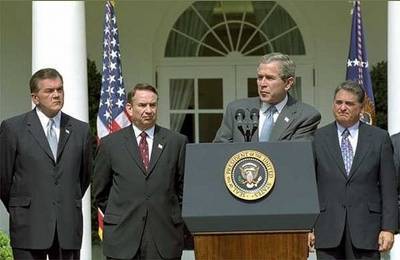
Still Processing The First Bail-Out
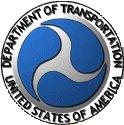 While
most major carriers did not take advantage of the loan program, all
of them sought cash reimbursements for losses related to the
attacks on New York and Washington. As of mid-March, the
Transportation Department had received more than 400 applications
for compensation and still had a full-time staff handling a backlog
of requests.
While
most major carriers did not take advantage of the loan program, all
of them sought cash reimbursements for losses related to the
attacks on New York and Washington. As of mid-March, the
Transportation Department had received more than 400 applications
for compensation and still had a full-time staff handling a backlog
of requests.
The agency has stretched payments over three installments,
analyzing complex applications and validating calculations from the
airlines on how much money they should receive.
Amounts have varied from $774 million for United Airlines, owned
by UAL Corp., which is in bankruptcy, to under $1,000 for a tiny
aviation firm. Big carrier payments were completed months ago.
Tax Relief
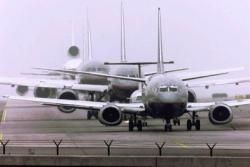 But senior Transportation Department officials
have told Congress and said in interviews they hope the new aid
plan will coalesce around proposals to reimburse or forgive certain
fees or taxes. They hope the payout or credit could be done within
weeks, rather than over a period of months.
But senior Transportation Department officials
have told Congress and said in interviews they hope the new aid
plan will coalesce around proposals to reimburse or forgive certain
fees or taxes. They hope the payout or credit could be done within
weeks, rather than over a period of months.
"We do want the bills to be written in a manner that is
practical. The simpler and more straightforward, the better," one
administration official said.
"It is essential that a financial aid package designed to assist
just one affected industry -- the airlines -- include narrowly
defined relief terms and be of limited duration," said
Transportation Department Inspector General Kenneth Mead.
Airline Aid Plan Options
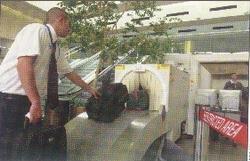 The separate aid plans would suspend certain fees
for aviation security for the next six months. The government would
pay the carriers between $900 million and $1.1 billion.
The separate aid plans would suspend certain fees
for aviation security for the next six months. The government would
pay the carriers between $900 million and $1.1 billion.
But the $3.2 billion House proposal offers a retroactive fee
reimbursement to significantly boost the amount of money each
airline would receive. That would add more than $1 billion to the
cost of the bailout and require applicants to account for the
amount of fees each has collected since the early part of last
year. The payout would vary for each carrier.
The $3.5 billion Senate plan would also reimburse airlines for
some of the estimated $300 million cost of replacing cockpit doors
with stronger ones on thousands of planes. The Federal Aviation
Administration has said all big airlines will meet this week's
deadline for completing the job. The Senate bill would also
authorize $225 million in extended unemployment benefits for
airline workers.
Is It Fair?
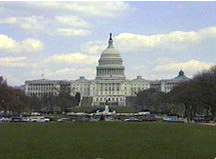 While some members of Congress say aiding a single
employment sector is unfair to workers in other hard-hit
industries, a bipartisan group of lawmakers on the conference
committee that will determine the scope of the aid urged President
Bush on Friday to support the worker aid proposal. The airline
industry has cut 10,000 jobs since the Iraq war began almost three
weeks ago.
While some members of Congress say aiding a single
employment sector is unfair to workers in other hard-hit
industries, a bipartisan group of lawmakers on the conference
committee that will determine the scope of the aid urged President
Bush on Friday to support the worker aid proposal. The airline
industry has cut 10,000 jobs since the Iraq war began almost three
weeks ago.
But one senior Transportation Department official said he could
not see the administration supporting this provision or another one
offering $375 million to help airports with security costs. There
is a $235 million airport security provision in the homeland
security section of the war spending bill.
But the administration has in the past supported extending
government help for airlines to meet their high-end liability
insurance premiums, which accounts for nearly $1 billion in the
Senate plan and has widespread support in Congress even though such
a request was not included in the House package.
 ANN's Daily Aero-Linx (05.06.25)
ANN's Daily Aero-Linx (05.06.25) ANN's Daily Aero-Term (05.06.25): Ultrahigh Frequency (UHF)
ANN's Daily Aero-Term (05.06.25): Ultrahigh Frequency (UHF) ANN FAQ: Q&A 101
ANN FAQ: Q&A 101 Classic Aero-TV: Virtual Reality Painting--PPG Leverages Technology for Training
Classic Aero-TV: Virtual Reality Painting--PPG Leverages Technology for Training Airborne 05.02.25: Joby Crewed Milestone, Diamond Club, Canadian Pilot Insurance
Airborne 05.02.25: Joby Crewed Milestone, Diamond Club, Canadian Pilot Insurance







